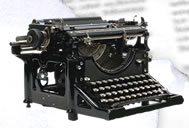"
Conscription and Conscience
" by John W. Graham is very briefly reviewed here; the summation provides some fast facts on the history of British conscientious objectors during World War One, yet tactfully fails to mention that during the course of the war, the British Army ordered 306 conscientious objectors be shot at dawn. In 2006 the British government pardoned them; just in time.
Here are a few lines from "The American Legion Weekly" that reported to their disappointed veteran readership that the foreign-born men residing legally in the United States who were previously accused of shirking the 1917 draft were, in fact, absolved from service and thus free to swear the oath of citizenship, after having been slandered as draft dodgers and alien-slackers until the finer points of the selective service law was clarified.
This is a fiery editorial from a U.S. veteran's magazine covering American law enforcement's search for the 487,003 young men who resisted the draft of 1917-1918.
"The War Department will take care of the actual deserters, the men who went into camp and then deserted. Such men are liable to prosecution at any time in their lives. The Department of Justice will get after the draft dodgers, who never answered the summons..."
"Only eight men are serving sentences as draft deserters in Federal penitentiaries, Mr. Taylor declares. 'Yet, the number of men defying our country in its hour of need, was many times the number who deserted the Army after the Armistice.' Thirty-nine men, he states, are still serving time for desertion from the Army, and the draft deserters are serving shorter average sentences than are the soldiers who took unauthorized leave of the service after the Armistice."
By 1917 an visible anti-conscription movement had taken root throughout much of French Canada that was encouraged by the Quebec Archdiocese.
In 1944, many French Canadians would be doing the same thing...
Few topics were as irksome to the editors of THE AMERICAN LEGION WEEKLY than that of the draft dodger. This article appeared one year after the close of the war and presents all the facts about the deferment process and how many native-born American men had shirked their responsibility to kin and country.
An interesting article by photojournalist James Hare (1856 – 1946) who told us his impressions as to how patriots and recruiting officers prowl about Hampstead Heath in search of volunteers. He was dumbstruck by the high number of men who simply shrugged when reminded of the national emergency.
